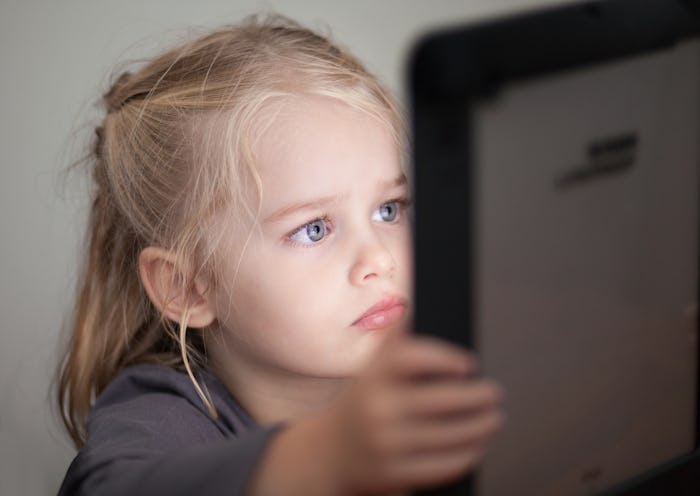Life

5 Times When You Should Pay Attention To Your Kid's Screen Time
As technology has evolved and expanded over the last decade, kids are spending more and more time staring at screens. My kids, for one, are drawn to flashy, exciting games and streaming videos which, let's be honest, are sometimes my saving grace. But while screens can be convenient, there are times when you should absolutely pay attention to your kid's screen time. Turns out, you can definitely have too much of a good thing.
According to a 2017 kid's media survey provided by Common Sense Media, children ages 8 and below are averaging over two hours of screen time a day, usually on a mobile device or tablet. The same study found that in 2011, only 41 percent of families had a mobile device. Now 95 percent do. In 2011, less than 10 percent of families had a tablet. Now almost 80 percent do. And while some studies suggest the type of content your child consumes is more important than the number of hours they spend on a device, there are a few signs that could let you know the amount of time your kid holds an iPad is becoming troublesome.
The American Academy of Pediatrics (AAP) recently updated their screen time guidelines, reporting that screen time restrictions are outdated. Instead, the AAP is calling for more research to definitively account for the various types of media exposure our children consume. In other words, and according to Oxford University's Internet Institute and Cardiff University study, how your kids are engaged in digital technology is more important than how long they're engaged. But if you start noticing a few of the red flags below, it may be time to re-think the amount of time you allow your kids to be on screens.
When They're Acting Out
According to Psychology Today, your kid has indulged in too much screen time if you notice they' have an "irritable mood, poor focus or disorganization, low frustration tolerance, and problematic behaviors such as argumentativeness or poor eye contact." They go on to add that depression and anxiety are also common signs that you're child is spending too much time focusing on a screen.
If you notice that your kid's mood is dramatically worse after sitting in front of a screen, it might be time to cut back for the sake of their still-developing brain.
When They'd Rather Engage With A Screen Than Their Peers
It's somehow become socially acceptable to sit and scroll through your phone at dinner, at parties, and in the company of literally anyone. A 2015 Deloitte study, assessed and reported via Time, found that Americans checked their phones 46 times per day, on average. But a 2017 Asurion study reported by New York Post found that Americans check their phones an average of every 12 minutes. That comes out to about 80 times per day.
In another study that measures screen addiction in children, lead author and researcher, Sarah Domoff, says, "kids who use media in unhealthy ways have problems with relationships, conduct and other emotional symptoms." When the time comes your kid would rather play games on an iPhone than with a living, breathing friend, you should consider cutting down on the iPad time.
When It Affects Their Health
Matthew Johnson of Media Smarts tells CBC Parents that if your kids are replacing activity time with screen time, it could "build bad habits" and lead to a "less active lifestyle when they get older." There's nothing wrong with a little relaxation, to be sure, but if you notice your child moving around less, or avoiding active play in favor of sitting on the couch and playing with an iPhone, it may be time to encourage some kind of physical activity.
When It Affects Sleep
Jenny Radesky, assistant professor of pediatrics at University of Michigan and author of the 2016 American Academy of Pediatrics policy statement, Media and Young Minds, says that because screen time is "more immersive and on-demand" than simply sitting down and watching a television show, handheld devices are more difficult to put dow and walk away from.
If your child is overstimulated, or constantly thinking about getting back to the screen, their sleep can suffer. According to USA Today, the "blue light wavelength emitted by various gadgets, including your smartphone and tablet, actually suppresses melatonin, which is the hormone that keeps you in a normal sleep cycle. That bright shining screen is actually messing with your body's built-in clock, keeping your brain alert when it should be resting and recovering."
When They Start Hiding Their Habit
If your kiddo is sneaking in some extra screen time in the middle of the night, or lying about how often they're on their tablet, it may be time to re-think some boundaries. According to Canada's Centre for Digital and Media Literacy, "a big step is controlling your media time is being mindful of it." In order to help your child learn mindfulness, the same organization suggests parents "get creative" once screen time is up. "When screen time is over, encourage them to draw, write or act out stories about their favorite characters so they don't have to say goodbye when the screen goes dark."
Check out Romper's new video series, Bearing The Motherload, where disagreeing parents from different sides of an issue sit down with a mediator and talk about how to support (and not judge) each other’s parenting perspectives. New episodes air Mondays on Facebook.